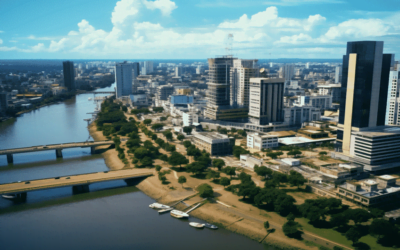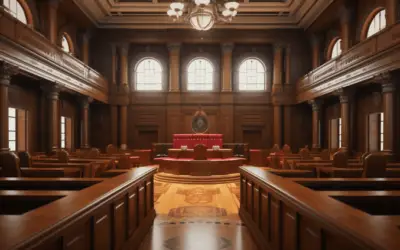Hey there, fellow drone enthusiasts! Are you feeling a bit perplexed about Pakistan’s drone laws? Don’t worry; I’ve been there too. It can be quite overwhelming to navigate the world of regulations, especially when you’re excited about exploring the skies with your drone.
You might be wondering, “What are the rules? How do I fly legally and responsibly?” Well, buckle up because I’ve done the research, and I’ve got all the answers you need to satisfy your curiosity and ease your drone-flying worries.
In my quest to unravel the complexities of Pakistan’s drone laws, I embarked on a thorough research journey. I dove deep into the intricacies of the regulations, ensuring I could provide you with the most accurate and up-to-date information available.
From hobbyist drone flights to commercial operations, I’ve gathered insights that will not only clarify your doubts but also empower you to fly your drone confidently within Pakistan’s legal boundaries.
So, here’s the deal: If you’re looking for a comprehensive guide that demystifies Pakistan’s drone laws, you’re in the right place. In the following sections, I’ll break down the classifications, restrictions, and requirements for different types of drone operators.
Whether you’re a hobbyist, a commercial flyer, a tourist, or even a government entity, I’ve got tailored information just for you. Let’s dive in and explore the skies together while staying compliant with the regulations.
Keep reading, and I’ll show you how you can take your drone adventures to new heights, legally and responsibly!
- Development of Drone Laws in Pakistan
- Drone Classifications
- Hobbyist Drone Operators
- Commercial Drone Operators
- Drone Regulations for Visitors and Tourists
- Government Drone Operations
- Additional Regulations and Safety Measures
- Staying Updated and Compliant
- Final Thoughts on Pakistan Drone Laws
- Frequently Asked Questions on Pakistan Drone Laws
Development of Drone Laws in Pakistan

Let’s dive into the fascinating journey of Pakistan’s drone regulations, shall we? These laws have evolved significantly over time, shaping the way we can explore the skies with our trusty drones.
Brief History of Drone Regulations in Pakistan
A few years ago, the drone landscape in Pakistan was a bit like the wild west. Drones were gaining popularity among hobbyists and entrepreneurs, but there was a lack of specific regulations to guide their operation.
It was an era of ambiguity and uncertainty. Enthusiasts like us were left wondering about the dos and don’ts, and there was an itch for clarity.
However, as drones continued to gain momentum globally and within Pakistan, the authorities recognized the need for a structured regulatory framework.
This recognition was essential to ensuring safety, security, and accountability in the rapidly growing drone industry. And so the journey to develop comprehensive drone laws in Pakistan began.
Current Status of Regulations and Ongoing Developments
Fast forward to today, and we find ourselves in a period of transition. The Pakistan Civil Aviation Authority (PCAA) has taken the reins to develop, implement, and enforce drone regulations.
The intent is clear – to strike a balance between enabling the incredible potential of drones while ensuring the safety and security of the airspace and the people on the ground.
As of now, Pakistan’s drone regulations are in a state of flux. The PCAA is hard at work, crafting and refining the rules that will govern drone operations in the country.
It’s a significant step forward, emphasizing the importance of aligning with international best practices and standards.
This dynamic environment means that staying updated is more critical than ever. Regulations can change, and as enthusiasts, it’s our responsibility to keep ourselves informed and comply with the evolving guidelines.
So, if you’re looking to navigate Pakistan’s drone laws, you’re in for an intriguing ride. Stick with me as we explore the nuances and details that will guide our drone adventures in this ever-changing landscape.
Also Read: Oman Drone Regulation 2024
Drone Classifications

Have you ever wondered about the different types of drones and how they’re classified? Let’s embark on an exciting journey through the world of drone classification.
It’s more than just knowing whether it’s a small or large drone; it’s about understanding the maximum take-off mass (MTOM) and the rules that govern these flying machines.
Drone Classifications Based on Maximum Take-Off Mass (MTOM) or Maximum Take-Off Weight (MTOW)
Drones, like birds in the sky, come in all shapes and sizes. But what distinguishes them isn’t just their appearance; it’s their maximum take-off mass (MTOM). This is the total weight of the drone, including the drone itself, the payload, and any additional equipment.
The Pakistan Civil Aviation Authority (PCAA) categorizes drones based on their MTOM, and this classification is a pivotal factor in determining the rules that apply to them.
Detailed Breakdown of Class-I to Class-V Drones and Their Respective Restrictions and Requirements
So, what are these different drone classes, and how do they affect our flights? Well, it turns out there are five classes, and they each come with their own set of rules.
Class-I drones are the lightweights, weighing less than 250 grams. They enjoy certain freedoms but still need to play by some rules. As we move up the scale to Class-V, which is more than 150 kilograms, things get a bit more serious.
Class-III, Class-IV, and Class-V drones, the heavyweights, have specific requirements. They need to obtain a Certificate of Airworthiness (CoA) and a Remote Pilot Operator License (RPOL), and they must adhere to the rules of the air.
For those flying Class-I and Class-II drones, restrictions apply regarding altitude and the areas where you can operate. Safety is a priority for all drone operators, but the degree of regulation varies based on the class.
Stick with me, and we’ll dive deeper into these classifications, understanding what they mean for our drone adventures in Pakistan.
Also Read: Norway Drone Regulation 2024
Hobbyist Drone Operators

Now, let’s talk about all you drone hobbyists out there who are in it for the sheer thrill of flying. You’re not here for work; you’re here to have fun in the sky. So, what are the rules and freedoms you need to know about when operating your drone as a hobbyist?
Regulations Governing Hobbyist Drone Operators in Pakistan
First things first, let’s get a grasp of the regulations that apply to hobbyist drone operators in Pakistan. The good news is that, yes, you are allowed to fly your drone in Pakistan for recreational purposes.
However, this freedom comes with certain responsibilities. While you don’t need to be a licensed pilot to fly recreationally, it’s crucial to abide by the rules set forth by the Pakistan Civil Aviation Authority (PCAA).
No Requirement for a Hobbyist Drone Pilot License
As a hobbyist, you can leave your pilot dreams aside; there’s no need to obtain a drone pilot license. You’re free to take to the skies without that additional paperwork.
However, don’t forget that while you might not need a license, you do need knowledge. Understanding the safety guidelines and regulations is key to ensuring a smooth and enjoyable flight.
No Drone Registration Needed for Hobbyists
Another perk for hobbyists is that you’re exempt from the requirement of registering your drone with the authorities.
Unlike commercial operators, you can skip this step and jump straight into the action. But remember, just because your drone doesn’t need a license plate doesn’t mean you can fly without any care.
Altitude Limits, No-Fly Zones, and Safety Guidelines for Hobbyist Operators
Now, let’s talk about altitude, no-fly zones, and safety. Hobbyist drone operators can fly up to 200 feet above the ground, providing ample opportunities to capture stunning aerial shots.
However, certain restrictions apply; your drone must stay over your property, and you need to steer clear of airports, airfields, sensitive areas (think nuclear power plants and police stations), and the national border. Your adventures should be safe, responsible, and respectful of the privacy of those on the ground.
So, whether you’re exploring a new hobby or fine-tuning your drone piloting skills, it’s important to understand these guidelines.
Flying for fun is all about enjoying the experience while being mindful of the rules and ensuring everyone’s safety in the process. But what about commercial operators, you ask? Don’t worry; we’ll dive into their world next.
Also Read: Northern Ireland Drone Regulation 2024
Commercial Drone Operators

For those who see drones as more than just a pastime and instead as a tool for business, there’s a whole set of regulations tailored to ensure a balance between innovation and responsibility.
As a commercial drone operator, you’re venturing into a world of opportunities, and you’ll want to understand the rules that govern your skyward ambitions.
Regulations for Commercial Drone Operators in Pakistan
Operating a drone commercially in Pakistan involves navigating a unique set of rules. The Pakistan Civil Aviation Authority (PCAA) has outlined regulations specifically for commercial drone operators.
This framework is designed to facilitate the use of drones for various business purposes, including aerial photography, surveying, and deliveries while maintaining safety and accountability.
Mandatory Commercial Drone Pilot License
Here’s a pleasant surprise for commercial operators: there’s no mandatory requirement for obtaining a separate commercial drone pilot license in Pakistan.
While hobbyists might not need a license either, commercial operators can capitalize on their flying skills without the added bureaucratic hurdle. However, flying commercially doesn’t mean you’re exempt from understanding the rules and following best practices.
No Drone Registration Required for Commercial Operators
Unlike some other countries, Pakistan doesn’t require commercial drone operators to register their drones.
The lack of mandatory registration simplifies the process for businesses looking to integrate drones into their operations. But it’s not a free pass to skip other responsibilities, particularly regarding safety and compliance.
Commercial Drone Insurance Recommendations and Best Practices
One of the crucial aspects of flying drones commercially is ensuring that your operations are covered by insurance. While it’s not mandatory, having drone insurance is highly recommended.
Accidents happen, and the last thing you want is to face liability issues or financial losses due to unexpected mishaps. By securing the right insurance coverage, you can protect your business and your clients’ interests.
So, if you’re considering elevating your business with the help of drones, understanding these regulations and best practices is essential. Operating commercially offers immense potential, but it also demands a heightened level of responsibility.
With the right knowledge and adherence to the rules, you can unlock the full potential of drones in your business endeavors. Next up, we’ll explore the drone regulations tailored for visitors and tourists, so stay tuned for more insights.
Also Read: North Macedonia Drone Regulation 2024
Drone Regulations for Visitors and Tourists

For all our drone enthusiast friends visiting the picturesque landscapes of Pakistan, or even those who call it home, we’ve got you covered. Exploring the skies with your drone is an exciting prospect, and it’s essential to know the regulations that apply, especially when you’re just a visitor.
Specific Regulations Tailored for Foreign Visitors
Visitors and tourists, this one’s for you. Pakistan welcomes you to capture its beauty from the sky but with a few distinct regulations in place.
These regulations ensure that your drone adventures are both enjoyable and compliant with the law.
No Need for a Foreign Visitor Drone Pilot License
The good news is that you won’t need to jump through hoops to obtain a foreign visitor drone pilot license. You’re free to unleash your drone and explore the breathtaking landscapes without this additional requirement.
It’s about making your experience as seamless as possible while respecting the country’s regulations.
Exemption from Drone Registration for Visitors and Tourists
Another convenience is that, as a visitor or tourist, you’re exempt from the need to register your drone with the authorities.
No tedious paperwork, just a chance to soar into the sky and capture the beauty of Pakistan. However, this doesn’t mean that you can neglect other responsibilities, especially when it comes to safety and privacy.
Recommendations Regarding Drone Insurance
Now, here’s a piece of advice: while it’s not mandatory, having drone insurance is a smart move.
Accidents can happen even to the most experienced flyers, and the last thing you want is to be caught off guard in an unfamiliar country.
Protecting your drone and your peace of mind through the right insurance coverage is a wise choice.
So, whether you’re a visitor or a tourist in Pakistan, these regulations are designed to make your drone flying experience memorable and trouble-free.
The country’s diverse landscapes offer a perfect canvas for your aerial adventures, and understanding and respecting the rules ensures that you can explore with peace of mind.
Stay with me as we delve into the regulations tailored for government drone operations. There’s more to explore, so let’s continue this thrilling journey.
Also Read: Nigeria Drone Regulation 2024
Government Drone Operations

When it comes to drone operations in Pakistan, government entities play a unique role. Their flights are not just about exploration or business; they often revolve around security, compliance, and accountability.
Let’s explore the specific regulations and requirements that apply to government drone operations in Pakistan.
Regulations Applicable to Government Drone Operators in Pakistan
Government drone operators have a distinct set of regulations to adhere to. These regulations are designed to ensure that government drone flights align with the broader goals of security and safety.
It’s crucial to operate within these guidelines, given the significant responsibilities associated with government drone operations.
Requirement for a Government Drone Pilot License
One of the notable differences for government operators is the requirement for a government drone pilot license.
This adds an extra layer of qualification to the operation of government drones. While it’s not a free pass to fly anywhere, having licensed pilots in control ensures a certain level of competence and responsibility.
Mandatory Drone Registration for Government Operations
Unlike visitors and tourists, government operations are not exempt from the requirement for drone registration.
Registering government drones is a necessary step to ensure accountability and traceability in the event of any incidents or concerns. This requirement aligns with the broader principles of transparency and responsibility.
Special Considerations for Government Drone Flights, Including Security Clearance
Government drone flights often involve sensitive areas and missions that require additional precautions. Special considerations include the need for security clearance and adherence to specific flight protocols.
These measures are in place to safeguard national security and ensure that government operations are carried out with the utmost care and responsibility.
For government entities in Pakistan, the regulations surrounding drone operations are both vital and stringent. It’s essential to understand and follow these guidelines, given the unique nature of government drone flights.
Staying compliant ensures that government operations contribute to security, compliance, and accountability within the country’s airspace.
Now, as we move forward, we’ll explore the additional regulations and safety measures that apply to all drone operators, regardless of their category. Let’s keep the journey going!
Also Read: Niger Drone Regulation 2024
Additional Regulations and Safety Measures

Here’s where the rubber meets the road—additional regulations and safety measures that apply to all drone operators, no matter their category. It’s all about ensuring the skies are shared responsibly and safely.
Prohibited Areas and No-Fly Zones, Emphasizing Sensitive Locations
Certain areas in Pakistan are off-limits for drone flights, and these are places where safety and security are paramount.
You must steer clear of airports, military installations, and public facilities like correctional institutions, police stations, and courts. This ensures that critical operations on the ground and in the air are not compromised.
Restrictions Related to Public Roads and Take-off/Landing Grounds
Public roads might seem like convenient take-off and landing spots, but that’s a no-go. Public roads should be off your list unless you have the relevant local authority’s approval.
The goal here is to prevent disruptions to traffic and ensure that your drone operates safely and away from potential hazards.
Minimum Age Requirements for Drone Operators
In the world of drones, age isn’t just a number. If you’re under 16, you’re not eligible to operate a drone.
For those who are 16 or older, you need to register with the Pakistan Civil Aviation Authority (PCAA). It’s all part of ensuring that drone operations are in capable hands.
Regarding altitude, you can’t just keep climbing without limitations. The maximum elevation above ground level for an individual over 18 is 400 feet.
This restriction aims to keep drone operations within a safe and controlled range.
These additional regulations and safety measures are crucial for the safe and responsible operation of drones in Pakistan.
They help ensure that the skies are shared harmoniously and without disruptions to critical operations on the ground.
As we conclude our journey through Pakistan’s drone laws, remember that responsible drone flying contributes to the growth of the drone industry and the safety of our shared airspace.
If you’re looking for more specifics, read on to discover the intricate details of Pakistan’s drone regulations.
Also Read: Nicaragua Drone Regulation 2024
Staying Updated and Compliant

Our journey through Pakistan’s drone regulations has been insightful. But here’s the thing about rules—they can change. To ensure that you continue to operate your drone within the bounds of the law, staying updated and compliant is essential.
Importance of Regularly
The drone world is a dynamic one, with technology and regulations evolving constantly. What you knew yesterday might not be the same tomorrow.
That’s why it’s crucial to keep a keen eye on the Pakistan Civil Aviation Authority (PCAA) for the latest updates and revisions to drone regulations. Staying informed means you can adjust your operations to meet the latest safety and legal requirements.
Resources and Official Channels
But where can you find these updates? The PCAA provides valuable resources and official channels for obtaining the latest information on drone laws in Pakistan.
Their website is a treasure trove of documents, guidelines, and contact details for your queries. Keeping this website bookmarked and checking it regularly is the best way to ensure that you’re always in the know.
So, as we wrap up this journey through Pakistan’s drone laws, remember that responsibility and compliance are not just one-time efforts.
They’re ongoing commitments. Keep an eye on the PCAA’s updates, stay informed, and enjoy your drone adventures in Pakistan safely and responsibly. Happy flying, my fellow drone enthusiasts!
Also Read: New Zealand Drone Regulation 2024
Final Thoughts on Pakistan Drone Laws

Our journey through Pakistan’s drone laws has been an eye-opening adventure, hasn’t it? As we conclude, let’s reflect on the key takeaways and the importance of responsible drone usage in this ever-evolving landscape.
Pakistan’s drone laws are more than just regulations; they’re a framework designed to strike a balance between innovation, safety, and accountability.
As drone enthusiasts, we have the privilege of exploring the skies and capturing breathtaking moments, but with this privilege comes responsibility.
Understanding and following these regulations is not just a legal obligation; it’s a commitment to the safe and responsible growth of the drone industry.
In a world where technology advances at a breakneck pace, it’s vital to emphasize responsible drone usage, safety, and compliance with evolving regulations.
Keeping abreast of updates, whether it’s a change in maximum altitude or a new no-fly zone, is essential for ensuring that our drone operations are not just compliant but also safe for everyone involved.
As drone operators, we have a unique role to play. By promoting safe drone practices and complying with regulations, we contribute to the responsible growth of the drone industry in Pakistan.
We set an example for others, including newcomers and tourists, and demonstrate that drones can be a powerful tool for innovation while respecting the privacy and security of those around us.
So, fellow drone enthusiasts, remember that as you embark on your aerial adventures in Pakistan, you’re not just exploring the skies; you’re shaping the future of drone technology in this beautiful nation.
Fly responsibly, stay informed, and share the joy of safe drone practices with others. Together, we can make the skies safer and more accessible for all. Happy flying!
Frequently Asked Questions on Pakistan Drone Laws
Navigating the intricacies of Pakistan’s drone laws can raise many questions. Let’s address some of the most frequently asked ones, ensuring you have a clear understanding of the regulations and how they apply to your drone operations.
Are drones allowed in Pakistan, and what are the regulations?
Drones are indeed allowed in Pakistan, but they must comply with the regulations set by the Pakistan Civil Aviation Authority (PCAA).
The regulations cover various aspects, including drone classifications based on maximum take-off mass, restrictions for different classes of drones, and specific rules for hobbyists, commercial operators, tourists, and government entities.
While some categories, like hobbyist operators, may not require a license or registration, all drone operators are bound by certain altitude limits, no-fly zones, and safety guidelines.
Do I need a license to operate a drone in Pakistan as a hobbyist?
No, you don’t need a separate drone pilot license if you’re operating a drone as a hobbyist in Pakistan. However, it’s crucial to familiarize yourself with the rules and regulations set by the PCAA. While you may not need a license, understanding and adhering to the guidelines is essential for safe and responsible drone flying.
Is drone registration required in Pakistan for hobbyists or tourists?
Hobbyist drone operators and tourists are exempt from the requirement of drone registration in Pakistan. This streamlines the process for those who want to enjoy drone flying without the additional paperwork. However, remember that even without registration, all operators need to follow the regulations for safe and responsible drone use.
What are the restrictions on drone flights near sensitive areas in Pakistan?
Sensitive areas, such as airports, military installations, and public facilities like police stations and courts, are designated as no-fly zones. Drone operators, regardless of their category, must steer clear of these areas to ensure safety and security. These restrictions are in place to prevent any potential interference with critical operations on the ground.
How can I stay updated with the latest drone regulations in Pakistan?
To stay updated with the latest drone regulations in Pakistan, regularly check the official resources provided by the Pakistan Civil Aviation Authority (PCAA). The PCAA’s website is a valuable source of information, offering documents, guidelines, and contact details for inquiries. Staying informed about updates ensures that you remain compliant with the evolving regulations and can enjoy safe and responsible drone operations in Pakistan.













